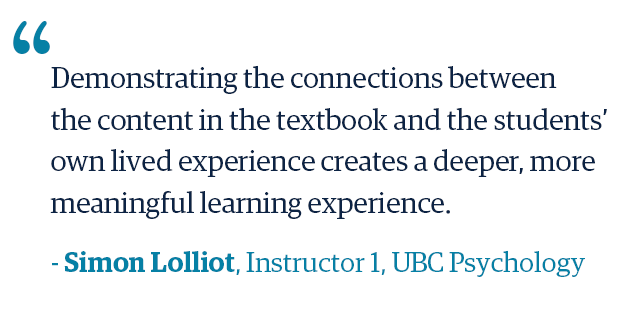Simon Lolliot’s drive to teach was shaped by his family, his path to education, and his teachers. Lolliot, instructor 1 in the department of psychology, uses his own experiences to shape his students’ experience in the classroom. He says psychology is a subject that is unique in that we live it, all the time.




We sit down with Lolliot to learn more about his approach to teaching, what he does outside of the classroom, and his advice for students. Hint: it has to do with Netflix.
First of all, can you tell us a little about yourself?
Born and raised in South Africa, I first completed an undergraduate degree in music at Stellenbosch University after which I finished a graduate degree (honours) in psychology and a postgraduate certificate in education (PGCE). After my PGCE, I was fortunate enough to receive a Rhodes scholarship to the University of Oxford where I completed my doctorate in Experimental Psychology (Social Psychology) studying the role that intergroup contact plays in reconciliation. I have spent the past two years here at UBC as a postdoctoral researcher and teaching instructor with Drs. Toni Schmader and Andrew Baron.
What attracted you to teaching?
I come from a family of teachers, and so I guess you could say it is in my blood. But there have been a series of events that have drawn me to the profession. Mostly, if I think back to my own educational path and the struggles I have faced, some of the people who have most impacted my life—both as a person and as an academic—are the teachers that I have had. The potential to have such a profound effect on someone’s life in this way is what has most drawn me to teaching.
How would you describe your approach to teaching?
I teach for understanding and through experience. Psychology is a subject that is unique in that we live it, all the time. Demonstrating the connections between the content in the textbook and the students’ own lived experience create a deeper, more meaningful learning experience.
What can you learn from your students?
Students keep you on your toes. They look at psychological phenomena and research (old and new) with fresh eyes. Students’ social contexts are moving more online and, as such, can change as quickly as a snapchat message lasts; seeing how the students apply the content that we cover in class to their own lives provides me with plenty of learning opportunities.
What learning or studying advice do you have for your students?
Take some time to figure out how you learn best. We all have different ways in which we understand, integrate, and process information. Switch up your learning techniques every now and then to see if something better fits how you understand information.
Oh, and, you cannot study with Netflix on in the background. It just does not work.
What are your research interests?
I am very interested in the pedagogical outcomes of diverse friendship networks. There are numerous benefits to having a solid social network to tap into and fall back on in times of need. Given that UBC is so diverse, and with diversity comes different ways in approaching academic content, does having a strong diverse social network lead to better pedagogical outcomes?
Do you have a motto or favourite quote?
Education is not the learning of facts, but the training of the mind to think. – Albert Einstein
It is the mark of an educated mind to be able to entertain a thought without accepting it – Aristotle
What do you like to do in your free time?
I love hiking, going to gigs, and reading.


